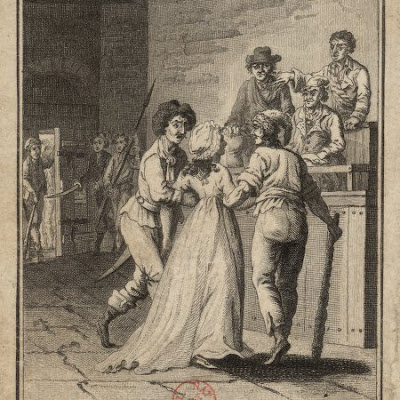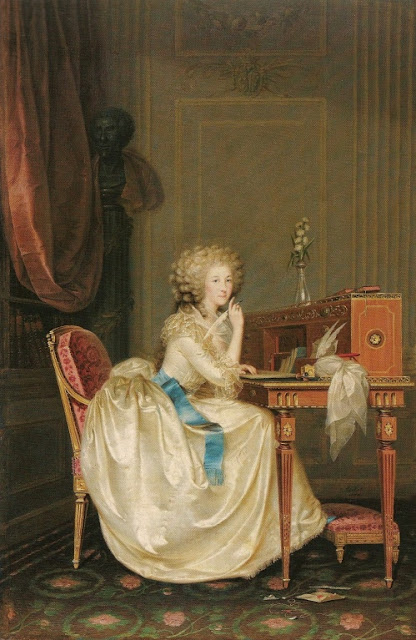The Murder of the Princesse de Lamballe
The Princesse's service to the Royal Family was over in August 1792 when she, and Governess to the Children of France, the Marquise de Tourzel, and her teenage daughter, Pauline, were removed from The Temple, and imprisoned at La Force. On September 2, in one of the most well-known atrocities of the September Massacres, the Princesse was subjected to an impromptu mock trial.
What happened, according to Catherine Hyde's account, as included in her editing of the Lamballe's journal:
"The massacres had begun at midnight. The fiends had been some hours busy in the work of death. The piercing shrieks of the dying victims brought the Princess and her remaining companion upon their knees, in fervent prayer for the souls of the departed. The messengers of the tribunal now appeared, The Princess was compelled to attend the summons. She went, accompanied by her faithful female attendant.
A glance at the sea of blood, of which she caught a glimpse upon her way to the court, had nearly shocked her even to sudden death. Would it had! She staggered, but was sustained by her companion, Her courage triumphed. She appeared before the gore-stained tribunes.
After some questions of mere form, her highness was commanded to swear to be faithful to the new government, and to hate the King, the Queen, and royalty.
"To the first," replied her highness, "I willingly submit. To the second, how can I accede? There is nothing of which I can accuse the Royal Family. To hate them is against my nature. They are my sovereigns. They are my friends and relations. I have served them for many years and never have I found a reason for the slightest complaint."
Hyde says that an eyewitness, someone who had known the Princesse since childhood, had been at the scene, followed the Princesse's body for as long as possible afterwards and had personally related the events to herself (Hyde).
According to Antonia Fraser's "Marie Antoinette, the Journey," when pressed to denounce the King and Queen, the Princesse, once so fragile that she fainted at the least provocation, refused, with the words: "I have nothing to reply. Dying a little earlier or a little later is a matter of indifference to me. I am prepared to make the sacrifice of my life."
Thus rebuked, the judges released her, knowing full well that their directive sent her to the street where the frenzied mob was ready and waiting. They set on her immediately. Reports vary, but agree that at the very least, she was sexually mutilated and decapitated. Supposedly her head was taken to a barber to repair the damage enough that her famous blond locks would be recognizable when her head decorated the end of a pike.
The witness accounts of Cléry, Louis XVI's valet de chambre, and Marie-Thérése, Marie Antoinette and Louis XVI's daughter, among others, are uncontested. The crowd, drunk on a combination of wine, hatred, and ignorance, boisterously paraded to The Temple Tower, the head of the former Princesse Marie Louise of Savoy aloft, where they attempted to show it to Marie Antoinette. In a twisted attempt at humor, they wanted the Queen to kiss the lips of the woman whom the libelles had (falsely) accused of being her lover. The King and Queen, their children, the King's sister, Elizabeth, their remaining attendants, and their guards were aware of the chaos that had taken over Paris as (the pre-planned) violence spread from the prisons to the streets. Cléry and the Tisons, a couple who'd been assigned to aid/guard/spy on the family, were the first to see the Lamballe's head. The loyal Cléry rushed to the family to prevent them from seeing the sight, but before he had a chance to break the news to them, an official brusquely told Marie Antoinette that the head of the Princesse de Lamballe had been brought on a pike to illustrate how "the people avenge themselves of tyrants." Marie Antoinette, according to her daughter, Marie-Thérése's (she was the only member of the captive family to survive the Revolution) memoirs, was, for a moment, "frozen with horror" before she dropped to the ground, unconscious.
Some people claim that the Duc de Penthièvre, at one time one of the wealthiest men in France, paid a fortune in bribes in an attempt to rescue his daughter-in-law then spent a fortune for the recovery of her body and/or head, in order to give her a proper burial. No one really knows if that's true.
What happened, according to Catherine Hyde's account, as included in her editing of the Lamballe's journal:
"The massacres had begun at midnight. The fiends had been some hours busy in the work of death. The piercing shrieks of the dying victims brought the Princess and her remaining companion upon their knees, in fervent prayer for the souls of the departed. The messengers of the tribunal now appeared, The Princess was compelled to attend the summons. She went, accompanied by her faithful female attendant.
A glance at the sea of blood, of which she caught a glimpse upon her way to the court, had nearly shocked her even to sudden death. Would it had! She staggered, but was sustained by her companion, Her courage triumphed. She appeared before the gore-stained tribunes.
After some questions of mere form, her highness was commanded to swear to be faithful to the new government, and to hate the King, the Queen, and royalty.
"To the first," replied her highness, "I willingly submit. To the second, how can I accede? There is nothing of which I can accuse the Royal Family. To hate them is against my nature. They are my sovereigns. They are my friends and relations. I have served them for many years and never have I found a reason for the slightest complaint."
Hyde says that an eyewitness, someone who had known the Princesse since childhood, had been at the scene, followed the Princesse's body for as long as possible afterwards and had personally related the events to herself (Hyde).
According to Antonia Fraser's "Marie Antoinette, the Journey," when pressed to denounce the King and Queen, the Princesse, once so fragile that she fainted at the least provocation, refused, with the words: "I have nothing to reply. Dying a little earlier or a little later is a matter of indifference to me. I am prepared to make the sacrifice of my life."
Thus rebuked, the judges released her, knowing full well that their directive sent her to the street where the frenzied mob was ready and waiting. They set on her immediately. Reports vary, but agree that at the very least, she was sexually mutilated and decapitated. Supposedly her head was taken to a barber to repair the damage enough that her famous blond locks would be recognizable when her head decorated the end of a pike.
The witness accounts of Cléry, Louis XVI's valet de chambre, and Marie-Thérése, Marie Antoinette and Louis XVI's daughter, among others, are uncontested. The crowd, drunk on a combination of wine, hatred, and ignorance, boisterously paraded to The Temple Tower, the head of the former Princesse Marie Louise of Savoy aloft, where they attempted to show it to Marie Antoinette. In a twisted attempt at humor, they wanted the Queen to kiss the lips of the woman whom the libelles had (falsely) accused of being her lover. The King and Queen, their children, the King's sister, Elizabeth, their remaining attendants, and their guards were aware of the chaos that had taken over Paris as (the pre-planned) violence spread from the prisons to the streets. Cléry and the Tisons, a couple who'd been assigned to aid/guard/spy on the family, were the first to see the Lamballe's head. The loyal Cléry rushed to the family to prevent them from seeing the sight, but before he had a chance to break the news to them, an official brusquely told Marie Antoinette that the head of the Princesse de Lamballe had been brought on a pike to illustrate how "the people avenge themselves of tyrants." Marie Antoinette, according to her daughter, Marie-Thérése's (she was the only member of the captive family to survive the Revolution) memoirs, was, for a moment, "frozen with horror" before she dropped to the ground, unconscious.
Some people claim that the Duc de Penthièvre, at one time one of the wealthiest men in France, paid a fortune in bribes in an attempt to rescue his daughter-in-law then spent a fortune for the recovery of her body and/or head, in order to give her a proper burial. No one really knows if that's true.





Comments
violence against innocents.
Thank you for your comment. Nothing I love more than a comment! Appropriate that Robespierre was shot (or shot himself) in the jaw after his orations did such damage, wasn't it? Some of the things he said were ridiculous, contradictory, and defied logic.
And was told by the Queen not to return. When the Queen wrote her a formal letter to resign or return Lamballe took the letter in good faith even though this formal letter was contrary to the many previous personal letters she had received from the Queen asking her NOT to return. She believed she was being loyal. And I believe it to but I feel strongly that Lamballe would have had more use for posterity, history and the understanding of future generations if she had saved herself and in doing so the Legacy of the Queen of France. The last chance she had to save herself was to swear allegiance to the revolution and then denounce the Royal family. She swore allegiance but refused to denounce the Royals. while I am filled with sadness and admiration for her loyalty and bravery I strongly feel that she could have achieved more in acquiescing, saving herself and once freed she may have been able to help save others through her wealth and connections. I am beyond sad to read about this even though it happened over 200 years ago.
As if the situation weren't poignant enough. I guess this letter sums up why the Lamballe returned to Paris and stayed. The Queen wouldn't leave her family's side. What went on during this era is mind-boggling. Thanks very much for your comment.